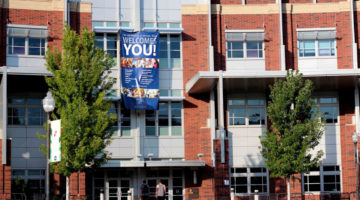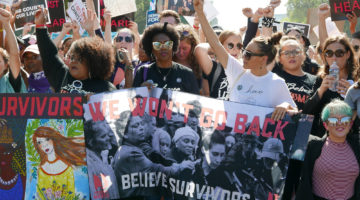
Breanna Denney /Nevada Sagebrush
University of Nevada, Reno senior Madeleine Poore poses for a portrait on Monday, April 20 in front of Ross Hall. Poore is the current president of Voices for Planned Parenthood and is a women studies and journalism major at the university.
By Maddison Cervantes
The summer before commencing her college career, Madeleine Poore faced an experience that warped her life into one of a stranger’s.
After moving to Reno from Australia at the age of 12, Poore spent her high school years being an involved and outgoing student at Edward C. Reed High School in Sparks, Nevada. Upon graduating and celebrating her last summer prior to college, Poore was sexually assaulted by a former peer.
As her first day of classes at the University of Nevada, Reno came and went, Poore sunk into a more confused state.
“My freshman year I was a walking zombie, I was in such a bad place and I didn’t have the words to really explain what had happened to me,” Poore said.
“Pretty much everywhere I turned I saw messages telling me that it was my fault.”
Because of her chosen image for the night, decision to “flirt” with the young man at the party and intoxicated state, Poore was under the assumption that she had influenced her assault in one way or another. Therefore, Poore kept the occurrence from her family and friends, along with students from her high school who ridiculed her once false word was spread.
“The way society lays it out is: ‘You do these things, then this happens to you and that’s your fault,’” Poore said. “And I believed that.”
Poore became motivated to understand her situation better, and discovered resources online that discussed the topics of sexual assault, feminism and rape culture. Poore stated that during her exploration of these topics, she was exposed to a language that was previously foreign to her; she was able to both understand and explain what had happened to her.
Upon seeing other survivors share their testimonies, Poore ultimately decided to seek professional help. Throughout her freshman year, Poore was seeing a therapist regularly. She then found the will to communicate her experience with close friends and eventually her mother.
“I started understanding that it wasn’t my fault,” Poore said. “I think that [sexual assault] is something that needs to be talked about openly because it happens to so many women. We need to show how strong women are.”
According to Poore, one in three women experience sexual assault in their lifetime. Poore believes that her experience, while highly traumatic, allowed her to grow and altered her perspective.
Along with her newfound mindset, Poore became motivated to help others understand sexual assault and other oppressions.
“I saw things that were wrong in our society and I was really driven to change them and see what I could do to make it better for other young women, so hopefully they don’t have to experience the isolation that I did,” Poore said. “And if they do, they will be able to seek support and know that it wasn’t their fault.”
Poore chose not to report her assault. She explained that when women experience sexual assault or other oppressions they are not always believed. However, Poore stated that less than one percent of cases reported are false.
Poore has friends who are survivors and stated that when police got involved in their cases, the survivors were asked unnecessary and victim-blaming questions. Additionally, Poore said that sexual assault is the only crime that occurs where the victims are interrogated as if they are at fault.
Through organizations like Voices for Planned Parenthood, Poore has become engaged in the feminist community. She has been involved in VOX since 2012 and is now president.
As a women’s studies major, Poore now has the knowledge, resources and language to tackle problems in society that involve power differences and oppression.
Continuing with her involvement, Poore is currently working through VOX and with Victim Advocate Justine Hernandez on organizing the university’s Take Back the Night, an event where local poets and survivors will speak out against sexual violence and share their stories.

File Photo
Senior Madeleine Poore speaks at Voices for Planned Parenthood’s Take Back the Night held on the Gateway Plaza on Thursday, April 24, 2014. Poore is also working to organize Take Back the Night for the third year which will be held on Thursday, April 30.
“[Poore] is a passionate and intelligent person who works to bring issues that are rarely discussed to the forefront of conversations,” Hernandez said. “She is actively involved with many organizations, not only within the University of Nevada, Reno, but also within the community at large.”
While entering into the university’s Gender Race and Identity Department for her women’s studies degree, Poore discovered other aspects of society that she was interested in.
“Through these classes, people I’ve met and movements I’ve become involved with I’ve gained a greater understanding of systems of power and oppression in our society,” Poore said. “I strive to always critically examine and work to dismantle them. Learning to look beyond my own experience, to listen, learn and center the experiences of others has been really important.”
In her continued efforts to combat the many different oppressions she has learned of, Poore strived to become involved in anti-racist groups and intersectional feminism discussion groups. With the help of UNR senior Chenay Arberry and junior Escenthio Marigny, Poore also co-founded the Reno Justice Coalition which is centered around creating dialogue and challenging injustice.
Assistant professor Emily Hobson has worked with Poore as a mentor during her advisory of the Reno Justice Coalition.
“Over the three years I’ve known her, I’ve been really impressed by her involvement in grassroots activism and by her passion to advance her own and others’ understanding of issues with sexual consent, reproductive rights, LGBTQ equality, and structural racism,” Hobson said.
Poore recently received UNR’s Henry Albert Public Service Award, which Hobson nominated her for, and the College of Liberal Arts Exemplar Award.
Poore stated that once an individual realizes the differences between the varying oppressions in society, it is apparent that one cannot hold all of the focus; they all need to be addressed.
“You can’t just liberate women if you’re ignoring racism because then you are only liberating white women,” Poore said. “We need to be lending our ears and listening to other peoples’ stories who experience a multitude of oppressions.”
Along with this, Poore believes that it is essential to avoid approaching these issues from a personal perspective.
Through her activism both on campus and off, Poore has been able to overcome her personal challenges and live a life that she feels is hers again.
Now living in MidTown, Poore has also taken an interest in other aspects of the city. Through her involvement in Reno’s culture, Poore has been able to work with the community to enact meaningful change.
“Living in a city can often shape you,” Poore said. “But I think that living in Reno has given me the ability to shape it.”
Maddison Cervantes can be reached at mcervantes@sagebrush.unr.edu and on Twitter @madcervantes.











